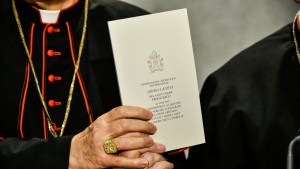
Both critics and supporters have recognized that Pope Francis’s new document Amoris Laetitia stands out from previous papal pronouncements for its flexible approach on such matters as the reception of church sacraments among the divorced and remarried. But what, if anything, will this document change in the relationship between the Vatican and world Catholicism on contested pastoral issues? The Economist (April 10) notes the “generous tone” of the papal letter (it is not a full-blown encyclical); even as it lays down traditional teachings likely to make conservatives happy (affirming the ban on contraception and disapproval of gay marriage), it takes a more tolerant tone in regard to those living in “irregular situations” (such as unapproved remarriages and gay Catholics), saying that such individuals should receive the church’s assistance, including participation in the sacraments in some cases. Thus, the document is suited to a world church seeking moral rules but also recognizing that they may have to be bent in widely differing contexts. In the New York Times (April 11), Lamin Sanneh, a Yale scholar of global Catholicism, agrees: the document “signals a cautious but important shift” to the “devolution of power to the local church.” Sanneh even argues that “by design there is a crack in the door” left by the document that may allow further liberalization on the issues involving gay and divorced Catholics.
While not all of the conservative Catholic media criticized the document, New York Times columnist Ross Douthat took particular aim at the way Amoris Laetitia represents a weakening of papal leadership and church unity. In his column in the Sunday New York Times (April 10), Douthat argues that Francis has embraced an unofficial “truce” that has long existed in Roman Catholicism: the Vatican’s consistent teaching has reassured conservatives that the church is still essentially unchanging, while the “flexibility and soft heterodoxy of many pastors and parishes and Catholic institutions enables liberal Catholics to feel reasonably at home while they wait for Rome to ‘evolve’ in their direction.” The pope’s letter in effect endorses this truce, saying that the tension and separation between doctrine and practice is “clearly a hoped-for source of renewal, revival and revitalization.” He concludes that the “new truce may be even shakier than the old one. In effectively licensing innovation rather than merely tolerating it…it promises to heighten the church’s contradictions rather than contain them. …Francis doubtless intends this language as a bridge between the church’s factions, just dogmatic enough for conservatives but perpetually open to more liberal interpretations,” but it is not likely to offer a “center” that will permanently hold together a “deeply divided church.”